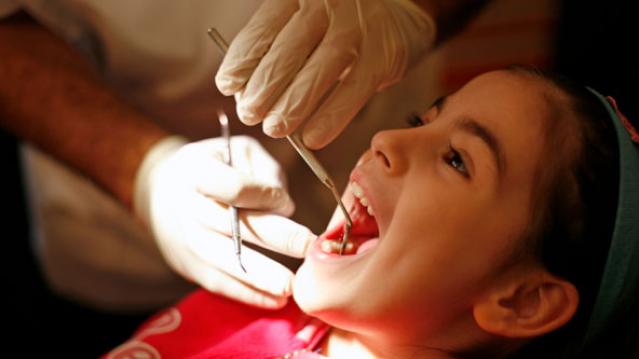Need a Good Dentist? You Might Want to Head to Mexico

Can you say “dentista?”
Increasingly expensive dental care costs are forcing seniors to bite down hard—and head to Mexico to preserve their pearly whites, the Associated Press reports.
Nearly 70 percent of seniors do not have dental insurance, according to a 2013 Harris Interactive survey commissioned by Oral Health America. Medicare does not cover dental care, and many employers do not offer post-retirement health benefits. You can get dental coverage through the Affordable Care Act, but only if you purchase general health coverage first. (Many seniors already have that coverage.)
Even with coverage, crowns, bridgework, implants and dental surgery can easily exceed the annual limit. As a result, seniors who need extensive dental work may have limited options and could face out-of-pocket costs running into the thousands or tens of thousands of dollars; 23 percent of seniors in the Oral Health America survey said they have not seen a dental provider in five years.
Related: The Hidden Costs of Dental Neglect
Just as people traveled to Canada to buy their prescription drugs at lower cost or traveling the world for other medical services and procedures, more Americans are now flocking to places like Los Algodones, Mexico for dental care. Dental care in Mexico is much cheaper, thanks to lower labor costs and fewer regulatory requirements — factors that you should keep in mind before heading south of the border. The dentists in Mexico maintain that they may not have as much education as their American counterparts, but they spend more time practicing clinical work.
It’s not just people who live in border cities like El Paso, Texas crossing the border to take care of their teeth. The Associated Press reports that shuttle services exist to take dental patients from the Phoenix area to Los Algodones, a 200-mile trip.
Before you book a trip, though, remember that should something go wrong you may not have the same legal recourse as in the U.S., and the dentists may use different types of equipment--so do your research first.
Top Reads from The Fiscal Times:
- America’s 10 Top Selling Medications
- Medicare’s Bold New Move on Knee and Hip Replacements
- 9 Social Security Tips You Need to Know Right Now
Deficit Hits $738.6 Billion in First 8 Months of Fiscal Year

The U.S. budget deficit grew to $738.6 billion in the first eight months of the current fiscal year – an increase of $206 billion, or 38.8%, over the deficit recorded during the same period a year earlier. Bloomberg’s Sarah McGregor notes that the big increase occurred despite a jump in tariff revenues, which have nearly doubled to $44.9 billion so far this fiscal year. But that increase, which contributed to an overall increase in revenues of 2.3%, was not enough to make up for the reduced revenues from the Republican tax cuts and a 9.3% increase in government spending.
Tweet of the Day: Revenues or Spending?

Rep. Kevin Brady (R-TX), ranking member of the House Ways and Means Committee and one of the authors of the 2017 Republican tax overhaul, told The Washington Post’s Heather Long Tuesday that the budget deficit is driven by excess spending, not a shortfall in revenues in the wake of the tax cuts. The Wall Street Journal’s Kate Davidson provided some inconvenient facts for Brady’s claim in a tweet, pointing out that government revenues as a share of GDP have fallen significantly since 2015, while spending has remained more or less constant.
Chart of the Day: The Decline in IRS Audits

Reviewing the recent annual report on tax statistics from the IRS, Robert Weinberger of the Tax Policy Center says it “tells a story of shrinking staff, fewer audits, and less customer service.” The agency had 22% fewer personnel in 2018 than it did in 2010, and its enforcement budget has fallen by nearly $1 billion, Weinberger writes. One obvious effect of the budget cuts has been a sharp reduction in the number of audits the agency has performed annually, which you can see in the chart below.
Number of the Day: $102 Million

President Trump’s golf playing has cost taxpayers $102 million in extra travel and security expenses, according to an analysis by the left-leaning HuffPost news site.
“The $102 million total to date spent on Trump’s presidential golfing represents 255 times the annual presidential salary he volunteered not to take. It is more than three times the cost of special counsel Robert Mueller’s investigation that Trump continually complains about. It would fund for six years the Special Olympics program that Trump’s proposed budget had originally cut to save money,” HuffPost’s S.V. Date writes.
Date says the White House did not respond to HuffPost’s requests for comment.
Americans See Tax-Paying as a Duty

The IRS may not be conducting audits like it used to, but according to the agency’s Data Book for 2018, most Americans still believe it’s not acceptable to cheat on your taxes. About 67% of respondents to an IRS opinion survey “completely agree” that it’s a civic duty to pay “a fair share of taxes,” and another 26% “mostly agree,” bringing the total in agreement to over 90%. Accounting Today says that attitude has been pretty consistent over the last decade.



